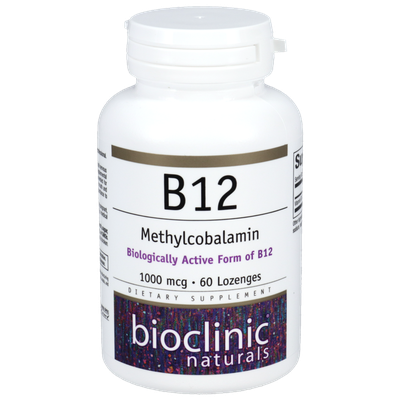Already have an account? Sign in

Vitamin B12 is the cofactor in enzymatic reactions with diverse physiological functions. It is required for the conversion of methylmalonyl CoA to succinyl CoA, as well as the conversion of homocysteine to methionine by methionine synthase, which is then converted into S-adenosylmethionine. A B12 deficiency causes impairments in both of these pathways, disrupting neurological function, including poor formation of myelin nerve sheaths, production of toxic levels of homocysteine, and inefficient energy production in all cells.
Cobalamin is also required to remove the methyl group from methyltetrahydrofolate and generate tetrahydrofolate, a necessary step in DNA synthesis. As a consequence, B12 deficiency affects the growth, function, and repair of all cells, the most apparent sign of which is megaloblastic anemia, caused by inhibited mitosis of red blood cells.
Benefits
•Superior to the more common form, cyanocobalamin as cyanocobalamin does not convert to enough methylcobalamin to correct some forms of anemia, neurological defects, and aging
•Methylcobalamin is the active form of vitamin B12 for maximum benefit
•Lozenges allow for fast acting delivery system directly into blood stream
•Lowers homocystein levels for protective cardiovascular benefits
Suggested Use:
Take 1 lozenge per day or as directed by a health care professional. Chew or hold in mouth until dissolved.
Serving Size: 1 lozenge
Amount Per Serving:
Vitamin B12 ... 1, 000mcg
(as methylcobalamin)
Other Ingredients: Lactose (from milk), cellulose, croscarmellose sodium, magnesium stearate (vegetable grade).
Product contains no: artificial preservatives, colors or sweeteners; no corn, soy, gluten, starch, wheat or yeast
B12 is contraindicated in patients with hereditary optic neuropathy, and may be cautioned against at high doses in oncology patients because of its role in DNA synthesis. Supplemental folic acid may mask a B12 deficiency, which should be ruled out, and folic acid and increased potassium intake is recommended with B12 therapy. B12 is considered safe in pregnant and lactating women, and may be indicated in children with a low dietary intake.
Although there is inadequate evidence to support the following drug interactions, caution should be taken. The following drugs may interfere with the absorption or utilization of vitamin B12: Antibiotics, Aldomet®, Atromid-S®, Azidothymidine (AZT), Azulfidine®, birth control pills, Cimetidine (Tagamet®), Metformin (Glucophage®), Isoniazid (Laniazid®), Pepcid®, Prevacid®, Prilosec®, Ranitidine (Zantac®).
Already have an account? Sign in
Already have an account? Sign in
Already have an account? Sign in
Already have an account? Sign in




